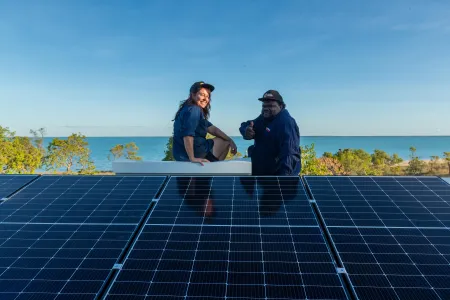Shining a renewable light on remote energy challenges
The innovative efforts to switch on renewable energy at remote Northern Territory communities will be discussed at a short film screening and panel discussion today at Charles Darwin University (CDU).
CDU, alongside First Nations organisations Original Power, Ngardara Collective, and First Nations storytelling agency GARUWA will screen Power to Country on Wednesday, a short film highlighting the energy issues facing many Northern Territory homeland residents.
The film focuses on Garrwa woman Shirley Simon, who was forced to leave her home at Mumuthumburru after the island’s power system failed, and the challenges she, her family and many others continue to face with a lack of adequate and affordable access to energy.
The screening will be followed by a panel discussion on sustainable power solutions for remote communities featuring Ms Simon and representatives from Original Power, Ngardara Collective, and GARUWA.
CDU Pro Vice-Chancellor Faculty of Science and Technology Professor Suresh Thennadil, who will be speaking on the panel, said finding long-term renewable energy solutions for communities was a significant research priority.
“Researchers across Charles Darwin University are dedicated to developing sustainable processes and products to address energy insecurity in the Northern Territory,” Professor Thennadil said.
“We are well-positioned in the Territory to provide the most effective solutions to one of our most pressing problems. The Northern Territory can be world-leading in its approach to installing affordable and efficient renewable energy, and the key to this is a multifaceted collaboration of science and community.”
Worimi woman Genevieve Grieves, who is the panel moderator, co-founder of GARUWA and supervising director of Power to Country, said the event was an opportunity to share knowledge and efforts to address this pressing issue.
“Less than 0.1 per cent of First Nations people in social housing have access to solar power, and the issue is in these communities that if you don’t have money to pay for power, you can lose access very quickly,” Ms Grieves said.
“This is a matter of life and death for people, because with climate change and rising temperatures, you can’t survive without access to power, which often also means no access to water.”
Also on the panel is PhD researcher and Djukun, Yawuru and Jaru-Kitja woman Cynthia Coyne, Yanyuwa man Ngardara Chairperson Conrad Rory, Garrwa man and Ngardara Cooperative Director Scott McDinny, Original Power Clean Energy Communities Coordinator Lauren Mellor, and Yanyuwa/Garrwa woman Annie Taylor.
First Nations Clean Energy Solutions is supported by CDU’s Energy and Resources Institute and the Research Institute for the Environment and Livelihoods.
The event begins at 11.30am on Wednesday, August 7 at CDU’s Casuarina campus.
Related Articles

First “hype cycle” of AI development put tech above humans
Users around the world have rushed to adopt artificial intelligence - especially in safety-critical fields - but a new study has revealed the hype has prioritised technology for technology’s sake instead of human-centred development.
Read more about First “hype cycle” of AI development put tech above humans
Nanoplastics hindering cognitive abilities of fish, international research shows
Nanoplastic exposure can impair the cognitive abilities of fish and could lead to significant impacts on marine species’ ability to survive, according to a new international study.
Read more about Nanoplastics hindering cognitive abilities of fish, international research shows
Eradication would cost billions: NT’s lessons for Pilbara’s cane toad management
Cane toads are predicted to invade Western Australia’s Pilbara region by 2041 if left unchecked, but the Northern Territory’s population of the pests hold key lessons that could save billions in eradication costs.
Read more about Eradication would cost billions: NT’s lessons for Pilbara’s cane toad management
